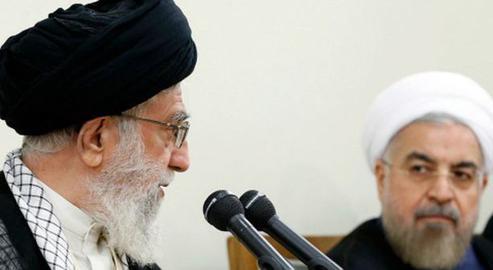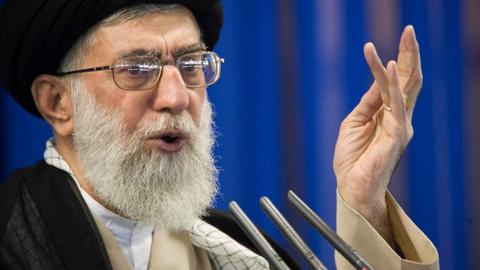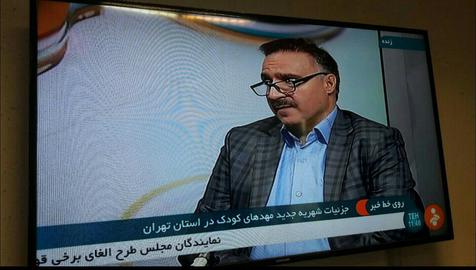Most people would struggle to find anything controversial about UNESCO’s Education 2030 Framework for Action, which emphasizes a need to “ensure inclusive and equitable quality education and promote lifelong learning opportunities for all.”
But in Iran, where religious and gender-based discrimination takes many forms, Supreme Leader Ayatollah Ali Khamenei has turned the existence of the UNESCO project into a stick with which to beat President Hassan Rouhani and his government.
"The UNESCO 2030 education agenda and the like are not agendas that the Islamic Republic of Iran should have to surrender and submit to,” Khamenei told teachers on May 7. “Why should a so-called international community — which is definitely infiltrated by the corrupt powers — have the right to make decisions for the various cultures among nations?"
Following Khamenei’s speech, senior officials in Rouhani’s government scrambled to assure Iranians that Khamenei’s worries were due to incorrect information he had received about Rouhani’s interest in using the UNESCO framework as a basis for education policy.
Rouhani later gave a speech in which he promised Khamenei that the framework would be implemented within the strict confines of Iran’s Islamic laws.
But none of this mollified the Supreme Leader. “This is Iran and the Islamic Republic,” he said in another speech on June 7, “and this nation is a great nation. Why must a few individuals at UNESCO, or the UN, [determine] our educational system?”
On this occasion, Khamenei went even further, criticizing Rouhani’s cultural policies. He specifically accused the Ministry of Culture and Islamic Guidance, which is one of the organizations responsible for state censorship of the arts and media, of being unable to make appropriate decisions.
Then, in a gesture in support of those Iranians favoring a hardline Islamist cultural policy, Khamenei gave a group called “Officers of the Soft War,” a center formed to promote and transmit his own messages, a free hand in countering Rouhani’s policies.
Khamenei’s new criticisms demonstrate his now well-established tendency to contradict Rouhani, much as he has contradicted previous presidents, such as the reformist Mohammad Khatami, who served from 1997 to 2003.
But there is something different at work here.
Whereas Khamenei used to distance himself from the policies of Khatami’s administration, personal relations between the two men remained respectful.
And while Khamenei often reacted harshly to President Mahmoud Ahmadinejad’s defiant behavior —in one case he called his actions illegal, immoral, and against Sharia—he still kept normal relations with Ahmadinejad’s administration.
But with Rouhani, the standoff is more broad-based.
Khamenei’s Double-Barreled Shotgun
Khamenei adamantly distances himself from both Rouhani and his administration. In his speeches, he has spoken sharply, sometimes even disrespectfully, of the president. He has criticized Rouhani himself, while simultaneously attacking his administration on a wide range of policy matters including diplomacy, culture, and housing development.
In his latest salvo, Khamenei told his “officers of the soft war” to “fire at will.” It is not clear how far this the organization will take this invitation, but Khamenei has clearly set an example for the forces arrayed against Rouhani, giving them a new lease of life following the decisive defeat of their favored candidate, Ebrahim Raeesi, in the 2017 presidential election.
Anti-Rouhani media outlets, especially those affiliated with the hardline Islamic Revolution Endurance Front, as well as supporters of former president Mahmoud Ahmadinejad, give voice to a vast reservoir of hatred against Rouhani and his administration.
Some of this hatred became apparent after the June 7 ISIS terrorist attacks in Tehran when the hardliners and the “officers of the soft war” tried to blame the attacks on Rouhani’s government and its policies.
Khamenei’s continued opposition to Rouhani will further inflame hardliners’ anger against Rouhani’s administration. It seems that Ayatollah Khamenei has yet to leave the election behind. Or perhaps, there something more serious at work.
After the terror attacks, Khamenei downplayed them and dismissed them as an exercise is “fumbling with firecrackers.” But in his relations with Rouhani, he is way past playing with firecrackers. He seems to be playing the arsonist.
visit the accountability section
In this section of Iran Wire, you can contact the officials and launch your campaign for various problems


























comments